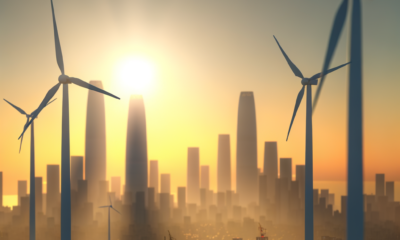Cars & Concepts
Trump’s Tug-of-War on EVs: Potential Impact on Auto Jobs, Industry, and ‘Made in America’ Promise

Trump aims to overhaul electric vehicle regulations: Potential impact on employment, car sector, and domestic production
Ex-President Donald Trump, a one-time Tesla Model S owner, has frequently criticized electric vehicles during his rally speeches as he campaigns for the 2024 electoral season.
Despite this, he's garnered support within the electric vehicle community. In July, Tesla's head honcho Elon Musk threw his support behind Trump's presidential campaign. The following month, Trump praised Musk as "a brilliant guy" and initially mentioned the possibility of appointing him to a consultancy position or a spot in his cabinet.
Trump might view Musk, known for his significant achievements in establishing a worldwide car manufacturer through electric vehicles, as a potential supporter in a forthcoming government, possibly heading a panel focused on enhancing governmental effectiveness.
Launch of Giga Texas Facility – Elon Musk
It's possible that Musk's recent significant layoffs at X (previously known as Twitter), along with his drastic reduction of staff at Tesla, including a near-complete dismissal of the Supercharger team, have influenced this perception. Trump has even labeled Musk as "the greatest cutter."
However, it creates uncertainty among individuals trying to decipher the ex-president's position on the progression of the electric vehicle sector. Given the inconsistency between his remarks and deeds, what implications could a potential second term of Trump's administration hold for electric vehicles?
During Trump's presidency, major American and European car manufacturers shifted from producing basic electric vehicles for regulatory reasons to developing more advanced, long-range electric vehicles that appealed to a broader audience. At the same time, Chinese car companies also turned their focus to electric vehicles. China openly aimed to foster globally competitive automakers and establish a robust clean-energy support system.
Throughout his tenure, Trump has lacked a clear agenda concerning clean energy, transportation, and the automotive sector, in stark contrast to President Joe Biden and, by association, Vice President and presidential hopeful Kamala Harris. Trump has maintained that the demand for electric vehicles (EVs) and plug-in hybrids is overestimated, attributing this to their price and mileage limitations. He has openly disparaged established car manufacturers for shifting towards electric vehicles, notably lambasting General Motors' commitment to a fully electric future, asserting that such a strategy is flawed.
Image of General Motors CEO Mary Barra captured by photographer Steve Fecht on behalf of GM.
Towards the end of 2019, President Trump put an end to the possibility of extending the tax incentives for Tesla and General Motors, both of which had already hit the sales limit of 200,000 vehicles that was set under the previous policy. Additionally, Trump put a hold on penalties for car manufacturers that did not meet fuel economy standards, following his administration's failure to decrease the penalty rates in court—a decision that probably had a dampening effect on the electric vehicle industry.
There hasn't been a significant shift towards a sustainable energy market. Reports suggest that in July, Trump sought a staggering campaign contribution of $1 billion from leaders in the oil and gas sector, promising in return to eliminate policies favoring electric vehicles, put a stop to the growth of wind power, and obstruct additional environmental-friendly energy policies that are not favored by the industry.
It appears that the oil sector didn't share the level of enthusiasm expected by the campaign. Should Trump view the industry through the lens of its former self, he could find the current landscape quite surprising. Modern global energy firms are heavily involved in renewable energy technologies such as solar arrays, battery storage systems, and electric vehicle charging infrastructures, alongside their traditional oil and gas operations.
Uber partners with BYD.
Trump vows to impose tariffs on China and Mexico
Donald Trump has reiterated his commitment to levying tariffs, a stance that is expected to be upheld by his administration. In March, Trump pledged to enforce a 100% tariff on vehicles manufactured in Mexico by Chinese companies, regardless of whether they are electric vehicles. He further stated that if Chinese car manufacturers opt to produce their cars in the United States, they would not be permitted to employ Chinese workers for the same.
The Biden government has intensified its approach after initially declaring it would, implementing significant increases in tariffs on Chinese goods such as electric vehicles (EVs), batteries, and steel, notably including a 100% tariff on EVs, though this does not extend to gasoline-powered cars. In a similar move, Canada has imposed a 100% tariff on EVs produced in China, labeling them as a "remarkable danger."
Apart from his stance on China, President Trump has emphasized that his government will implement measures to penalize businesses that outsource employment to Mexico, suggesting a potential further breakdown of the agreement formerly recognized as NAFTA. This pact, enacted by President Clinton following initiatives by President George H.W. Bush and the Reagan administration, has prompted car manufacturers to establish operations in Mexico over the last three decades, capitalizing on reduced wage expenses to produce cars and components for the American market.
Manufacturing Facility of BMW Group located in San Luis Potosí, Mexico.
Employment: Can Trump Preserve Biden's Progress?
To begin with, it's essential to examine the impact of Trump's policies on the automobile sector during his last term. Data from Harvard University indicates that during Trump's time in office, the U.S. saw a reduction of approximately 75,000 jobs in the manufacturing sector.
Former President Trump has often stated that automobile sales and production reached all-time highs while he was in office. Data from the U.S. Bureau of Labor Statistics (refer to the following chart) indicates a minor increase in employment and wages within the motor vehicle manufacturing sector during his time in the White House. However, a closer examination of the overall trend suggests that this growth was merely a continuation of the consistent recovery that had been ongoing since the financial downturn that hit the auto industry between 2008 and 2010.
The Harris campaign isn't experiencing only positive moments. Recently, a government body highlighted a significant drop in manufacturing employment, noting a decrease of 24,000 positions in August alone. However, it remains uncertain how many of these job losses are connected to the automotive sector.
Based on yearly averages, as reported by the federal government, the industry saw a direct employment of 993,500 individuals in 2019, which was the year before the pandemic that President Trump officially referred to as "the China Virus," also known as COVID-19, emerged. By 2023, this figure had increased to 1,040,500, and it is expected to rise considerably in 2024.
Changes in the number of jobs in the automotive sector – national
Under the Trump administration, China made major strides in the international automobile market, particularly in electric vehicles. However, the Biden government is making efforts to bridge the gap. A March report by the Environmental Defense Fund showed that from 2021 onwards, the United States is surpassing China in terms of investments in electric vehicle production.
The Environmental Defense Fund released a report last month, aligning with the two-year mark since the enactment of the Inflation Reduction Act, revealing that the United States has invested $199 billion in electric vehicle production. Of this investment, 63% has been made following the 2022 legislation. This funding has resulted in the creation of nearly 202,000 jobs connected to the EV sector and an additional 931,000 employment opportunities across the wider economy.
The Department of Energy, in a statement released in July, revealed that a significant portion of the funding, amounting to $1.7 billion, will be allocated to revamp and rescue 11 automotive production sites that are either currently inactive or facing potential closure. This financial aid will benefit facilities across eight different states.
Climate Power, a political group, asserts that the policies of the Biden administration have resulted in the creation of numerous jobs, not just in vehicle manufacturing and battery companies but also involving a $100 million grant program for small to medium-sized car component manufacturers, facilitated by the Infrastructure Law.
Image depicting the ExxonMobil oil refinery located in Baton Rouge, Louisiana, captured by WClarke and shared under the CC BY-SA 4.0 license.
Environmental Shift: Embrace Fossil Fuels
In Trump's 2016 campaign, rejecting the concept of climate change became a central aspect of various policy choices. He committed to reviving the coal industry and implied that the notion of climate change was a fabrication by China aimed at damaging American commerce.
After taking office, Trump has the potential to nominate another representative from the coal industry to lead the EPA, and take steps that weaken the EPA's authority to oversee electric vehicles within the regulations for fleet emissions.
It should be noted that in the upcoming 2024 elections, coal does not seem to be a primary focus of Trump's platform. However, industry analysts have indicated that a Trump-led government would likely implement policies that would extend the operational life of coal-powered facilities. Trump has recently vocalized his criticisms regarding the expansive space required for solar farms and has a long-standing opposition to wind energy, sometimes echoing unfounded claims believed to originate from competing factions. For example, he has made allegations that offshore wind turbines lead to whale fatalities and distress, which prompted marine experts from the National Oceanic and Atmospheric Administration to release a statement clarifying that there is no scientific backing for these assertions.
Emissions of greenhouse gases per individual across different nations [2018 Worldwide Climate Allocation]
Views among voters are shifting. Trump must also pay attention to voters' preferences on policies related to climate change, which are gaining favorability, including within his party. A CNN poll from December 2023 indicates that almost two-thirds of Americans express concern over the dangers of climate change, with 73% supporting measures to tackle it. Additionally, the poll reveals that half of the Republican respondents believe the U.S. should develop federal strategies aimed at reducing greenhouse gas emissions by 50% come 2030.
The behavior of the Republican party in Congress hasn't aligned with this perspective, indicating a potential need for a significant adjustment. This is especially true as Baby Boomers remain policy-makers, even as Gen Xers and Millennials, who are more knowledgeable about electric vehicles, are becoming increasingly influential consumers. In the previous year, House Republicans symbolically chose to weaken the Clean Air Act and backed multiple legal disputes against the EPA and the Department of Transportation regarding regulations on pollution. It appears probable that another confrontation with California's policies is imminent.
According to a recent update on August 9 by the advocacy group Climate Power, they have identified a total of 334,565 jobs that could be jeopardized due to the policies of the Trump administration in conjunction with the interests of major oil companies.
The latest Department of Energy's U.S. Energy and Employment report disclosed an impressive growth in clean energy jobs, expanding twice as fast as the average job growth in 2023. The report further highlights that three out of four positions in this sector do not necessitate a bachelor's degree. Furthermore, figures from the Brookings Institution suggest that jobs in the clean energy field could result in an income increase ranging from 8% to 19%.
According to Climate Power, approximately 134,000 of these positions are located in areas with lower income levels, and around 52,000 can be found in rural localities. A significant portion, representing two-thirds, is connected with sectors such as battery, wind, solar, and power grid industries. These specific job areas stand to miss out on financial support if a further term under Trump's presidency were to occur.
Tax incentive for electric vehicles faces uncertainty
On August 19, Trump mentioned he might put a stop to the $7,500 tax incentive given for electric vehicle purchases, noting to Reuters that he hasn't settled on a final choice yet. Additionally, Trump highlighted his belief that tax incentives and credits are typically unfavorable.
During his presidential tenure, Trump made efforts to eliminate or allow the expiration of the electric vehicle (EV) tax incentive. However, he lacked backing from Congress. It could require congressional consensus to address contentious aspects, such as the EV leasing provision that provides subsidies for foreign-made and high-end electric vehicle leases.
Investment in electric vehicle infrastructure by the IRA centers on ten
The potential unraveling of Biden's electric vehicle-centric agenda by Trump could prove difficult for the Southeastern U.S. to accept. This is because the drive to boost manufacturing and the subsequent expansion of the supply chain for electric vehicle production has been particularly advantageous for states that traditionally vote Republican.
According to EDF, the majority of the declared funding, amounting to 84%, is concentrated in a cluster of 10 states. This region extends from the historical automotive core in Detroit to the emerging nexus near Atlanta. The states benefiting from this investment include Georgia, North Carolina, South Carolina, Tennessee, Kentucky, Ohio, Illinois, Indiana, Michigan, and also Nevada. Furthermore, Climate Power highlights Texas as another significant center for financial infusion.
By the year 2027, manufacturing sites across the United States are projected to produce an estimated 5.8 million electric vehicles each year, which is anticipated to represent around 36% of the total new vehicles manufactured in 2023. A significant portion of these electric vehicles could also be shipped overseas.
What's the impact on the US electric vehicle shift with a Trump victory?
A Trump victory doesn't mean an immediate halt to the Inflation Reduction Act's benefits, nor will GOP leaders in states benefiting massively from electric vehicle industry investments and employment blindly conform to Trump's directives. They won't turn down federal funds already designated for their states. Rather, under Trump’s potential second term, we could see a gradual undermining of the federal support and initiatives established by the infrastructure bill and the Inflation Reduction Act, as he attempts to reshape remaining policies and maintain a good standing with Republican governors.
Mike Murphy, a GOP strategist with knowledge on the perception of electric vehicles based on political leanings, is actively involved in a campaign aimed at convincing Republicans to support EVs again. His latest initiative, which centers on Michigan, emphasizes the employment opportunities involved.
According to Murphy, unless Congress steps in, which would require a significant shift in favor of Trump-supporting Republicans, the President is powerless to target existing measures such as tax incentives, or to undo the substantial investment in manufacturing within the infrastructure legislation. However, this could result in a gradual decline of the most sustainable jobs in the automotive sector.
“His efforts to revoke certain policies could lead to significant partisan battles within Congress,” Murphy stated. He also mentioned that Republican governors from states that have greatly profited from the policy may resist efforts to overturn it.
A Trump-led government might just become an obstacle instead.
"Much of the allocated funds are currently in progress, but as the government, they hold sway over staffing," he explained. "There are roles within the Energy and Transportation Departments responsible for assessing and awarding grants… He could either leave those positions vacant or appoint adversaries, causing the process to stagnate in a dormant condition, a scenario that's not uncommon in policy discussions."
In such a scenario, there may be a backlog of state requests for financial support from the National Electric Vehicle Infrastructure (NEVI) program, which is part of President Biden's plan for a nationwide electric vehicle charging network, and these requests could remain unaddressed.
Murphy highlights that by 2026, California could be an unpredictable factor, with its electric vehicle requirement, established during former governor Gavin Newsom's term, possibly turning into a risk factor during an election.
Former President Trump's enthusiasm to diminish the powers of the Environmental Protection Agency could unintentionally end up being an unwelcome boon for car manufacturers, potentially disrupting their ability to compete internationally, particularly against China.
A photograph of President Donald Trump provided by the Department of Defense.
The Toxic Element of the MAGA EV
This leads us to revisit Elon Musk, whose name has been floated as a potential part of a Trump-led government in the future.
Musk holds the chief executive position at a firm that has reaped significant gains from the electric vehicle tax incentive, the stipulations for in-country manufacturing, and the electric vehicle strategy put forth by the Biden administration. In contrast, Trump has consistently made claims that electric vehicles "are all manufactured in China," disregarding the fact that Tesla produces a substantial number of electric vehicles within the United States, a portion of which is also sent overseas.
Murphy finds the survey results regarding Musk intriguing and points out that despite Musk heading a company that tops global electric vehicle sales, he still manages to maintain popularity among those on the right who are doubtful about EVs.
"He has the potential to shift Republican perspectives on electric vehicles, much like Nixon's groundbreaking visit to China. That's the key demographic to target in order to achieve the goal of 50% electric vehicle usage."
Elon Musk's presentation for the Tesla Model 3 launch
In various situations over the past few years, Musk has expressed doubts about the necessity of electric vehicle incentives, and he has even more recently declared his disinterest in receiving them.
Murphy views this tactic as shrewd, comparing it to the time when Philip Morris, which dominated the tobacco market, pushed for advertising restrictions in front of Congress. Even though Tesla's hold on the U.S. electric vehicle market has been slipping annually, it still commanded over 55% in 2023. Additionally, Tesla does benefit financially from subsidies, particularly in Europe, through the trading of carbon credits.
Musk has also tarnished his image as a pioneer in the electric vehicle industry due to his frequently unwise remarks, especially on X, which has turned into a hub for extreme right-wing supporters and a platform for broadcasting Musk's personal views on national identity, reproductive freedoms, gender, and the pursuit of gender equality. There's been a significant decline in electric vehicle purchases in California following Musk's acquisition of X, and it's evident from the content on his personal social media that numerous one-time Tesla enthusiasts have abandoned the brand due to his political stances.
In recent months, the research company Caliber observed a sharp decrease in Tesla's "consideration score," indicating that the brand's appeal has dropped significantly since November 2021. The firm attributes this decline to the influence of Elon Musk's public image. Additionally, a survey conducted by CivicScience in July revealed a trend where consumers' views on Musk are influencing their decisions on whether to purchase a Tesla. The data showed a notable number of electric vehicle customers are opting against buying a Tesla due to their opinion of Musk, as opposed to those who are motivated to purchase because of him.
In light of accumulating evidence, Tesla investors decisively sanctioned a compensation plan for Musk in June, which is anticipated to be worth $56 billion.
Considering Musk's participation in the sector and his friendly interactions with the contender on social media, Trump could decide to soften his approach. Alternatively, he might continue as is.
Preview of the Trumpchi GA4 unveiling at the 2018 North American International Auto Show
Murphy believes that due to Trump's transactional nature, his strong statements regarding electric vehicles may not translate into actual policy, and suggests that Trump might be exaggerating his stance.
Murphy expressed that if Trump continues to express disapproval of electric vehicles and influences other GOP leaders to do the same, it could negatively impact consumer attitudes. This could lead to a significant portion of potential buyers avoiding electric vehicles altogether. Under those circumstances, Musk may find himself with limited options for agreement.
Murphy conducted a survey targeting American voters who earn at least $50,000 annually—a group that encompasses nearly all prospective new vehicle buyers and two-thirds of voters during a Presidential election year. Within this demographic, 40% aligned themselves with the Republican party, 36% with the Democrats, and over 20% as independents.
"He indicated that Trump might continue to stir up trouble," he concluded. "That spells trouble for those interested in manufacturing and distributing electric vehicles within North America."
Production Hub Transformation – General Motors' Detroit-Hamtramck Facility Overhauled for Electric Vehicles
Decision Point: Electric Vehicles or Internal Combustion Engines?
Should Trump adopt a similar strategy, he might dismantle or cloud regulations that encourage electric vehicles, while offering rhetoric that discourages and de-incentivizes them.
Amidst discussions on trade, domestic manufacturing, and overseas production, this could result in an increase in electric vehicle manufacturing outside the United States.
Green Car Reports has sought feedback from company leaders on the accuracy of the Trump administration's claims that its policy will reduce car prices. Despite numerous discussions in recent weeks, the consensus among executives, who preferred not to be named, is that these claims are merely conjecture without any solid backup plan for another potential change in manufacturing sites.
Production of the 2025 Polestar 3 is set to take place at the Volvo facility located near Charleston, South Carolina, with a
In the automotive sector, it's a widely held belief that the internal combustion engine (ICE) market is on its last legs. The consensus isn't about whether the sale of new gasoline-powered vehicles will come to an end, but rather when this will occur. With the reduction of funds from initiatives like the IRA and the closure of electric vehicle (EV) manufacturing facilities, carmakers are left with little motivation to invest substantial sums in converting these plants back to ICE production, especially when such a move might only be viable for a short time.
Under the Trump administration, businesses could find themselves trapped in a cumbersome and fruitless situation where it becomes prohibitively costly and unrealistic to modify factories to resume production of traditional combustion engine vehicles for a short period, while also facing steep expenses to bring in various vehicle models from abroad.
Could the strategies implemented by Trump result in more affordable cars and a wider selection, or might they create instability within the automotive sector, causing greater variability in prices?
To some extent, Trump's approach could be about discerning the difference between what he communicates to satisfy his supporters' expectations and the decisions he'll make when influenced by advisors and cabinet members who aim to avoid dismissal.
It remains uncertain to what extent Vice President Harris will support President Biden's clean energy agenda, which emphasizes manufacturing. However, it's clear that Americans are presented with two vastly distinct economic paths to consider.
Labels:
Participate:
Spread the Word:
Get in touch with the chief:
Stay Updated:
Eco-Friendly Vehicle Digest
Register to receive daily updates on eco-friendly vehicles and environmental developments straight to your email!
I consent to getting email communications from Green Car Reports. I acknowledge that I have the option to opt out of these emails whenever I choose. Privacy Policy.
Waymo could change its strategy from utilizing electric vehicles from China as previously anticipated, to adopting Hyundai's Ioniq 5 for its autonomous taxi fleet.
Redwood Materials, a company founded by J.B. Straubel, is set to collaborate with BMW dealerships to recycle batteries once they are no longer functional.
The door handles on Volkswagen ID.4s may not be effectively sealing out water.
The combination of electric and gasoline engines has become the preferred choice for those driving the Honda Accord.
Do plug-in hybrids serve as a transitional step towards electric vehicles, or are they simply regulatory-driven options that buyers aren't interested in? The latest plug-in hybrid models being developed strive to achieve the former goal.
Owners of General Motors' electric vehicles now have the option to charge their cars at Tesla's Supercharging stations, although they will need to purchase an adapter
Tesla is steadily advancing towards introducing wireless charging capabilities for its electric vehicles.
The latest hybrid edition of the Toyota Highlander, set to release in 2025, will no longer offer a front-wheel drive option, as all versions will come equipped with all-wheel
There isn't a financial reserve set aside to manage unexpected safety recall tasks or other unexpected problems related to these electric vehicles. Owners are solely responsible for all costs except for the parts.
The leading Chinese battery manufacturer asserts that its upcoming electric bus batteries will boast higher energy density, improved durability, and faster charging capabilities.
In two years, Lotus plans to introduce an electric sports car that could bear a resemblance to the company's most recent concept vehicle.
Associated Content
Trending Now
Image Gallery
Current Events
Press
Retailer Resources
Feed Updates
Our Business
Connect With Us Now:
Discover more from Automobilnews News - The first AI News Portal world wide
Subscribe to get the latest posts sent to your email.






















































